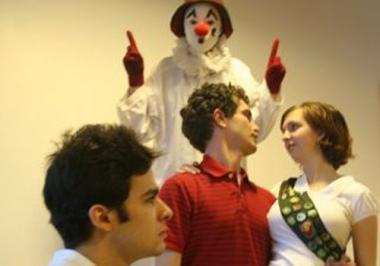Commedia dell Smartass
By Sonya Sobieski; directed by Dan and Ellen Morbyrne. Serious Play New Directors Series, East Street Studios, 47 East St., Hadley, March 7-9, 14-15, (413) 584-5535.
That title is intentionally double-take-inducing. It opens with the promise of the antique theatrical tradition Commedia dell'Arte, then blows a raspberry in your face. Like the title, the play itself upends conventions and expectations—in this case, the content and viewpoint of the typical high-school "problem" play. And contrary to the title's last word, it's cheeky but not flippant.
"There are all these plays about teen sexuality, suicide, drug use, alcoholism and so forth," says co-director Dan Morbyrne. "They tend to be about, 'Don't do drugs, don't have sex, don't do this, be like this, let's be helpful.' Some of those themes are present in this script, but that's not what the play is about."
What the play is about is the complex, often comedic interactions of four high school students who are typical in un-typical ways. Like the Commedia of the Italian Renaissance, which revolved around an assortment of recognizable stock characters, this Commedia presents us with four classic schoolroom types, the overachiever, the jock, the clown and the nerd.
Or rather, slightly off-kilter versions of those stereotypes, with names and costumes that reflect their chosen identities. The perky overachiever is neither a bookworm nor a cheerleader. She's Girl Scout (Trine Boode-Petersen), sporting a sash crammed with merit badges. The one called Fencer (Mike Pray) is an ostentatiously self-confident manipulator who affects high-flown pronouncements and carries a fencing foil on his hip. The Clown (Sigrid von Wendell) is literal—whiteface, baggy jumpsuit, floppy shoes and all.
Henry (Daniel Krstyen) is the only one of the quartet with a name instead of a label. He's also the most recognizably typical—a dorky guy who personifies every tongue-tied moment you've ever had with a prospective date.
The plot is as simple and archetypal as a Commedia dell'Arte scenario. Henry and Fencer both desire Girl Scout; they use various stratagems—bumbling and devious, respectively—to win her; she flirts with stimulants, physical and emotional; Clown comments wryly and silently on the goings-on while probing his (or her?) own identity; and everyone comes to a discomforting and revealing moment of self-discovery.
The show is directed by a pair of Serious Play alums, Dan and Ellen Morbyrne, trained in that youth company's strenuous aesthetic of experimental physical theater. They report that they were attracted to this script by its quirky take on the conventional teen-angst play.
"In this play, we get to bring up all those issues that schools and parents care about, that teenagers care about, without having to be about specific outcomes," says Ellen Morbyrne. "Some of the characters make healthy choices, sometimes they make unhealthy choices, and the audience get to make their own calls based on the unfolding of the story.
"I feel that the heart of the play is about perceptions," she continues. "It's about how the characters perceive themselves, and how they are perceived by others, and it's about what happens when they try to have some sort of agency in how they're perceived."
Inevitably, those perceptions are bound up with questions of sexuality. Fencer comes face-to-face with disturbing truths about his own macho persona, Girl Scout and Henry share tentative kisses and endure wrenching jealousies, and Clown is ultimately obliged to confront an ambiguous relationship with gender. Of this foursome, Clown is perhaps the most intriguing—the one who hides behind the thickest disguise and whose eventual self-exposure most effectively turns the tables on the audience's expectations.
Which is what this play, with its smartass title, is aiming for. And for actor Sigrid von Wendell, turning the tables is the whole point. "That's what I think art should do. It should make you unsettled and question everything."



